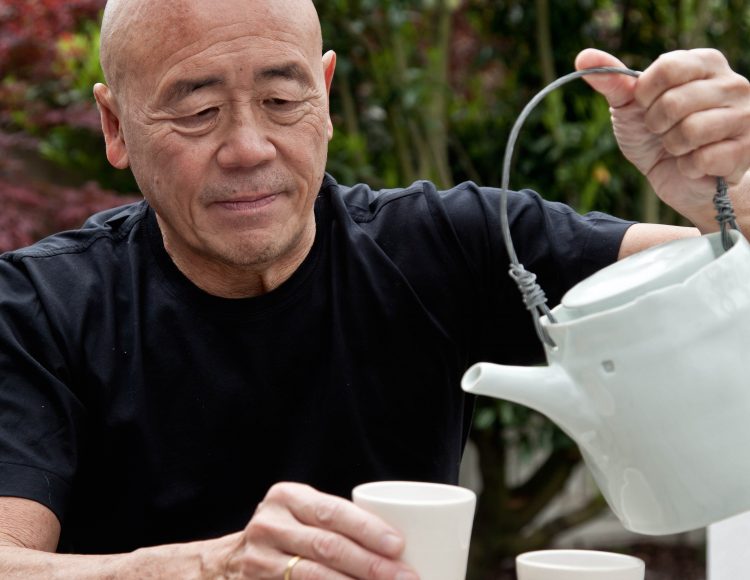[This interview originally appeared in the magazine, ‘The Vegetarian’.]
Over three decades ago, Ken Hom first appeared on UK television and opened up a world of Chinese cooking that was both affordable and easily achievable in your own kitchen. Now, Ken’s cuisine is as popular as ever, and his love of simple, healthy food packed with exquisite flavours lends itself perfectly to the creation of incredible veggie dishes…
The Vegetarian: Is vegetarian cuisine growing in popularity in Chinese food?
Ken Hom: Our vegetarian cooking is actually much more interesting than Western vegetarian. We have an array of things that we use, such as wheat gluten [also known as seitan] and lots of tofu in dozens of different ways. We think outside of the box. Chinese and Asian vegetarian food is quite exciting, and people eat it because they want to feel healthier – nothing beats vegetables in a hot wok, because you really get the flavour.
Combinations of lots of vegetables, I think are the best, healthiest and tastiest combinations. It’s the way we should be eating to lead a better life.
TV: What is your favourite way to use tofu?
KH: I do smoked tofu stir-fried with the freshest vegetables, and then simple garlic and chilli. I go for that!
TV: A lot of Chinese cuisine uses fish sauce – is there a good veggie alternative?
KH: Yes. Number one is soy sauce instead of fish sauce, it’s delicious. Lots of people don’t realise that there are many different types of soy sauces. There’s mushroom soy, which is wonderful and has a different flavour.
There’s also very thick, rich soy. There are also all kinds of pastes as well, such as chilli or bean paste, which are perfect for vegetarian dishes.
TV: Is it just a case of experimenting?
KH: Exactly. You can buy all these things at supermarkets now, you should buy as many different things as possible and try them. I encourage people to experiment, because that’s the best way to learn.
TV: Do you have a top tip for Chinese cooking at home?
KH: Anything properly cooked in a wok always works, no matter what it is. The best way to keep a wok is to make sure it is seasoned well. That means oiling it, and not washing it with detergent or scouring it. Do not put washing-up liquid on your wok, please! Wash it with warm water, and you don’t scour it. Before you put it away, put a coating of cooking oil on it. Usually I dry the wok under heat, and then use some kitchen towel to rub a little oil on the surface and then store it away.
 TV: Who was your cooking inspiration?
TV: Who was your cooking inspiration?
KH: My uncle, who I worked with when I was 11 years old. He taught me how to cook, he was my mentor and a father figure. He was the man!
TV: Who is the most interesting person you’ve cooked for?
KH: Probably Tina Turner. She was absolute adorable and wonderful, and she’s a Buddhist. She loves food, especially Asian food, and she’s a lovely person. I made an interesting vegetarian dish that she’d never had – bitter melon. She loved it.
TV: Is there one ingredient that you could never be without?
KH: Garlic. Oh, and chilli. I can’t live without those two. You can make anything taste good with those ingredients.
TV: Are there any good Chinese desserts you can recommend?
KH: [*Laughs*] We’re not good at that, no. I think in the West they make desserts much better; in China we don’t have much of a sweet tooth. When I was younger we didn’t really have dessert, we used to have fresh fruit, and actually that’s healthier for you and much more refreshing.
TV: What was it like when you first went on TV in 1982?
KH: It felt strange. The BBC had sent me a tape of Delia and said they wanted me to be like her – and I said that would be a bit difficult. But for me, it was quite terrifying – actually, psychologically traumatising. I found it really difficult to learn and remember lines, and I’d never done TV before. I didn’t do another series until nine years later, because I was so traumatised!
TV: What is the secret to the perfect stir-fry?
KH: Make sure you have all your ingredients ready beforehand. Get your wok very, very hot before you add the oil. When the oil is very hot and almost smoking, that’s when you start to add ingredients. Vegetables which are harder – pepper, asparagus – should go in first, and then leafy vegetables like spinach or cabbage at the very end. When you’re cooking in the wok with your veggies, don’t add more oil, add just a little bit of wine or water or stock and cover it, and then let the vegetables steam, then finally add your sauces. If you do all that, you’ll have a perfect stir-fry.
TV: For someone who has just a wok, how could they take their Chinese cooking to the next level?
KH: I always suggest that you start with the simplest stir-fries, and if you want to be really adventurous get my Complete Chinese Cookbook, which has everything at every level. Then gradually experiment, go from one thing to another, and soon you’ll see which dishes you like the best and what you’re most comfortable with.
TV: What do you consider to be your greatest achievement?
KH: I think exposing people to a way of eating and cooking that they didn’t know about; I hope it has enriched their lives and their families and friends. If I’ve achieved that I’m pretty thrilled.
[This interview originally appeared in ‘The Vegetarian’ winter 2016 issue, the members’ magazine of the Vegetarian Society. If you would like access to our magazine and to become a member, find out more here.]
Learn to cook delicious veggie food and see what the fuss is all about!







